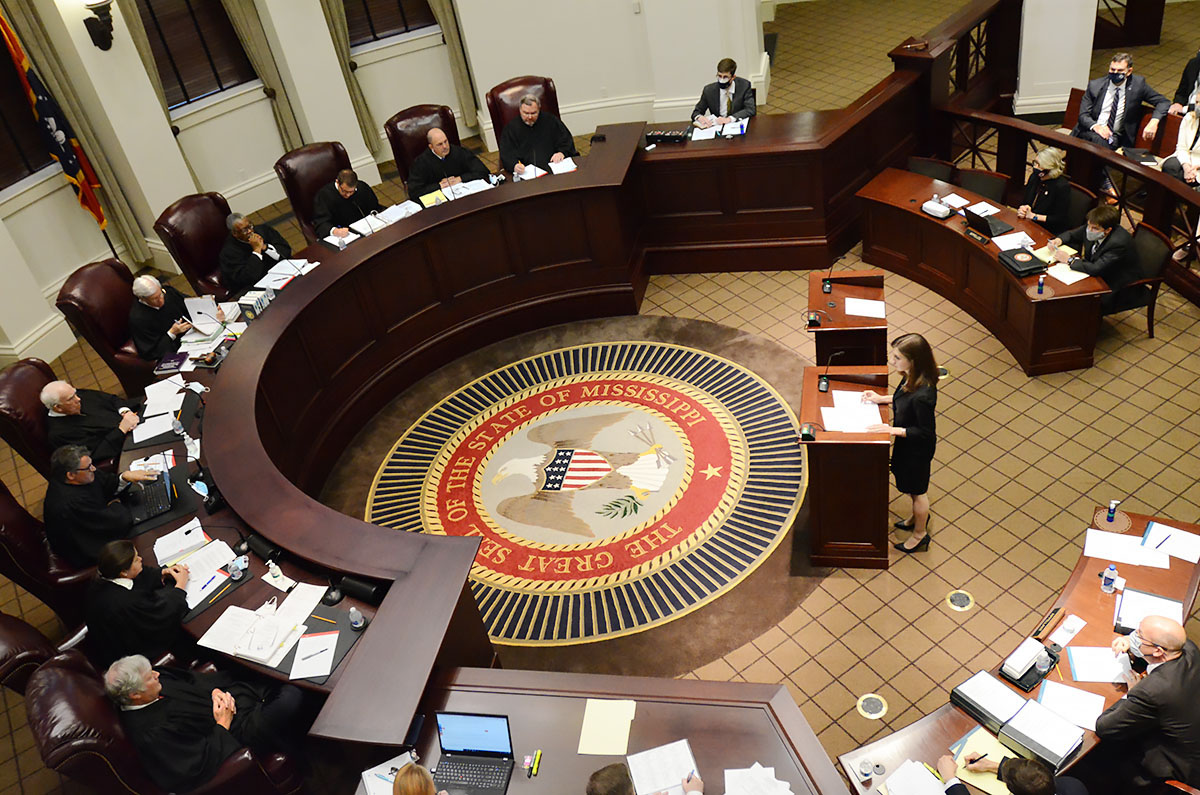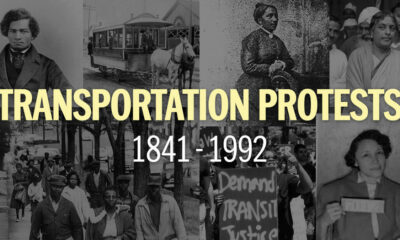Mississippi News
Will Supreme Court rely on literal reading when deciding legality of public funds to private schools?

Will Supreme Court rely on literal reading when deciding legality of public funds to private schools?
The Mississippi Supreme Court will most likely have an opportunity to rule on whether the state Constitution prevents the appropriation of public funds to private schools or explain why the Constitution does not mean what it says.
In recent years the nine members of the Mississippi’s highest court have sometimes adhered to the plain-reading-of-the-law principle in their decisions, while at other notable times they have not.
It has just depended on the issue and perhaps the mood of the court.
Plain meaning in legal parlance, according to Merriam-Webster, is defined “the language is unambiguous and clear on its face,” and “the meaning of the statute or contract must be determined from the language of the statute or contract and not from extrinsic evidence.”
Or, according to the Congressional Research Service, it is defined as: “The starting point in construing a statute is the language of the statute itself. The Supreme Court often recites the ‘plain meaning rule,’ that, if the language of the statute is plain and unambiguous, it must be applied according to its terms.”
On Oct. 13, Hinds County Chancellor Crystal Wise Martin ruled, based on the plain reading, that legislation passed earlier this year providing government funds to private schools was unconstitutional. The state Legislature provided $10 million in federal COVID-19 relief funds to private schools. It was added to legislation late in the session. Gov. Tate Reeves, long a private school proponent, signed off on the proposal.
Parents for Public Schools filed a lawsuit saying the appropriation was not valid based on that aforementioned plain reading of the Mississippi Constitution.
Martin sided with Parents for Public Schools in the case, but her ruling most likely will be appealed. That appeal means the Supreme Court will again have the chance to decide whether the text of a law, a constitutional provision in the case, should be adhered to or ignored.
In 2017, in a unanimous decision, the justices ruled that just because a law said “effective with fiscal year 2007, the Legislature shall fully fund the Mississippi Adequate Education Program” did not really mean the Legislature had to actually fully fund the program that provides the state’s share of the basics for the operation of the local school districts.
On the other hand, the justices did adhere to a law that said they “shall” receive a pay raise if recommended by the state Personnel Board. A little noticed section of a 2012 bill passed by the Legislature essentially gives the judiciary the authority to award itself a pay raise sans action of the Legislature. This judicial pay process seems in conflict with the fact the Constitution gives the Legislature the authority to appropriate funds. Plus, pay raises for elected officials normally are awarded based on the action of the Legislature not the judiciary.
Or to put it another way, when a law says local schools “shall” be fully funded, the plain reading is ignored by the Supreme Court. But when the law says the judiciary “shall” award itself a pay raise, the plain reading is followed.
The plain reading also was ignored in 2020 when the Supreme Court ruled that the state’s ballot initiative process was invalid. The court ruled unconstitutional the language approved overwhelmingly by the Mississippi electorate in the early 1990s that requires a mandated number of signatures to be gathered equally from five congressional districts to place an initiative proposal on the ballot.
The court found that because the state no longer has five congressional districts, the initiative process was unconstitutional. The court made that ruling without taking into account that the members of the Mississippi Community College Board, as well as other boards in the state, also are selected from the same five now defunct congressional districts. Perhaps the state Community College Board also is unconstitutional.
Section 208 of the Mississippi Constitution reads, “No religious or other sect or sects shall ever control any part of the school or other educational funds of this state; nor shall any funds be appropriated toward the support of any sectarian school, or to any school that at the time of receiving such appropriation is not conducted as a free school.”
Hinds County Chancellor Martin said that language is clear. It says what it says — no public appropriation to a school “not conducted as a free public school.”
It will be interesting to see if the Supreme Court will adhere to that plain language or find a way to uphold language supported by the leadership of the Mississippi Legislature and Gov. Tate Reeves.
This article first appeared on Mississippi Today and is republished here under a Creative Commons license.
Mississippi News
Events happening this weekend in Mississippi: April 18-20

SUMMARY: This weekend (April 18-20), Mississippi offers a variety of events for all ages. In Jackson, enjoy Food Truck Friday, a jazz concert, free outdoor movie screenings, and multiple exhibitions including “Of Salt and Spirit” and “Hurricane Katrina: Mississippi Remembers.” For family fun, there’s an Easter Egg Hunt at the Ag Museum and “Bunnies & Butterflies” at MCM. Natchez features the Spring Pilgrimage, Lafayette’s 200th anniversary celebration, and a farmers market. In the Pine Belt, highlights include Live at Five, a Spring Candle-Making Workshop, and Easter events at the Hattiesburg Zoo. Don’t miss the Bluff City Block Party and more!
The post Events happening this weekend in Mississippi: April 18-20 appeared first on www.wjtv.com
Mississippi News
Events happening this weekend in Mississippi: April 11-13

SUMMARY: This weekend in Mississippi (April 11-13), enjoy a variety of events across the state. Highlights include the Eudora Welty Birthday Bash in Jackson, Trivia Night at the Mississippi Museum of Natural Science, and Boots & Bling Fundraiser in Natchez. For family fun, check out the Bunny Bonanza in Jackson or the Easter Egg Hunt in Clinton. The Natchez Concours d’Elegance Car Show and Stranger Than Fiction Film Festival offer cultural experiences, while the 12th Annual Dragon Boat Regatta in Ridgeland and the Hub City Classic Car Show in Hattiesburg provide exciting activities for all ages.
The post Events happening this weekend in Mississippi: April 11-13 appeared first on www.wjtv.com
Mississippi News
Ole Miss women get pair of double-doubles and roll to 83-65 March Madness win over Ball State

SUMMARY: Mississippi coach Yolett McPhee-McCuin found solace in returning to a different arena in Waco, Texas, following a disappointing previous tournament experience. The No. 5 seed Ole Miss Rebels redeemed themselves with an 83-65 victory over 12th-seeded Ball State in the NCAA Tournament’s first round. Starr Jacobs led the Rebels with 18 points and 11 rebounds, while Kennedy Todd-Williams and Madison Scott each scored 15 points. Ole Miss dominated rebounding, leading 52-32, and will face fourth-seeded Baylor next. Coach McPhee-McCuin noted the team’s evolution since their last visit and the significance of playing in Texas, where Jacobs feels at home.
The post Ole Miss women get pair of double-doubles and roll to 83-65 March Madness win over Ball State appeared first on www.wjtv.com
-

 News from the South - Arkansas News Feed7 days ago
News from the South - Arkansas News Feed7 days agoMeasles cases confirmed in Arkansas children after travel exposure
-

 News from the South - Alabama News Feed7 days ago
News from the South - Alabama News Feed7 days agoImpacts of Overdraft Fees | April 11, 2025 | News 19 at 10 p.m.
-

 News from the South - Georgia News Feed7 days ago
News from the South - Georgia News Feed7 days ago1-on-1 with Gov. Kemp’s Senior Advisor | Full interview
-

 Mississippi Today5 days ago
Mississippi Today5 days agoOn this day in 1873, La. courthouse scene of racial carnage
-

 News from the South - Missouri News Feed7 days ago
News from the South - Missouri News Feed7 days agoMom and son targeted in carjackings, stolen cars crime spree
-

 Local News6 days ago
Local News6 days agoAG Fitch and Children’s Advocacy Centers of Mississippi Announce Statewide Protocol for Child Abuse Response
-

 Local News5 days ago
Local News5 days agoSouthern Miss Professor Inducted into U.S. Hydrographer Hall of Fame
-

 News from the South - Arkansas News Feed7 days ago
News from the South - Arkansas News Feed7 days agoFederal investigators looking into cause of deadly NYC helicopter crash
















































